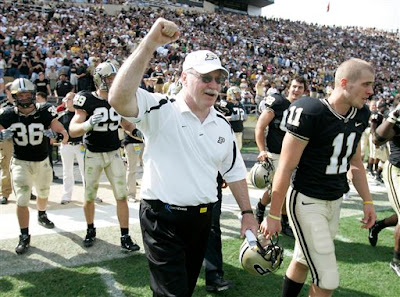This is a bit off the current topics of the season, but since it's Super Bowl week, I thought it might be appropriate. I was listening to the radio today and every radio show in America is being done from "radio row" at the Super Bowl and Tiki Barber was on. He was discussing the current state of the game and, of course, the upcoming game this weekend. And a point he made really resonated with me and made me wonder if it was possible that Joe Tiller had some hand in changing the way the game of football is played....nationwide.
Tiki was discussing the Super Bowl combatants and he commented on how Indy's rushing offense is 29th in the league -- and how that doesn't matter at all, because of how surgical Peyton Manning is. Fair point. He went on to talk about how the position of running back is quickly becoming less relevant to the point where he expects it to soon be less relevant than ever. This is because everyone runs some variation of the spread offense and bubble screens and quick outs and slants -- when done precisely -- are just as effective as a first down run play that used to be the bread-and-butter of every offense out there. You always ran on first down unless you were some wild-ass, Bill Walsh offense. And he was considered kind of kooky when he first ran it in the NFL.
So yes, the West Coast offense existed -- and succeeded -- for a number years, starting with those '80s Forty-Niners teams. But it's safe to say everyone else mainly relied on the tried and true method of success (and the "conventional wisdom" of many football lifers): run on first down, run on second down, maybe pass on third down. Oh, and the quarterback spent almost all of his time under center. The shotgun was a gimmick, sort of, and something that good defenses felt they could use to their advantage because it was almost always a sign of a sure passing down.
Then something funny happened over the past ten years or so. Spread offenses took over. They say football is a "copycat" sport (see the ridiculous proliferation of the dumb-ass, 1940s Wildcat offense) and so as spread offenses began to succeed more, more teams began to institute them. This spread (no pun intended) like wildfire, burning through the college ranks and down to high school, to the point where the guy currently referred to as maybe the best college football player ever can't get comfortable taking a snap from center. Crazy.
Joe Tiller came to Purdue in 1997 and immediately implemented a spread offense, infamously called "basketball on grass," a term that is still used by know-nothing commentators today, even when Purdue is running more plays on the ground than in the air. But think back -- Cowboy Joe's system in 1997 was a lot more revolutionary than it would be in 2010. Now, everybody runs a version of the spread. In 1997, approximately zero Big Ten teams ran such an offense. For years (up until his retirement, in fact), Tiller was cited as the reason that the Big Ten's offensive statistics and approach changed. Tiller began passing on first down and frequently "using the pass to set up the pass." We all loved it, of course, because it completely baffled Big Ten defenses (remember, that 1997 team was coming off a 3-8 1996 and didn't even really have the personnel for such an offense) and allowed the Boilers to race to a 9-win season. It was amazing.
Before long, more offenses in the Big Ten opened it up, as did many offenses around the country at that time. Just prior to that, what kinds of teams won national titles in college football? Teams like Nebraska, running the effing OPTION. Now what kinds of teams win it? Teams like Florida and Alabama and USC. Sure, they're not all overly pass-happy teams, but the threat of their passing attack is one of the keys to making them successful. Nebraska used to win titles with quarterbacks who had no business even being referred to as quarterbacks.
Whereas winning Super Bowls at the NFL level used to be done with running game and crushing defense, the St. Louis Rams of '99-'01 showed that you could be very successful (and win a Super Bowl) by passing the sh-t out of the ball and playing defense once in a while. The Rams did what nobody had ever been able to do -- outscore everyone.
So the question I ask you is this: Did Joe Tiller play some significant role in changing the way the game is played? Clearly, I'm not silly enough to think he was the cause, but is it fair to say that what he brought to the Big Ten helped make the pass-happy, spread approach more mainstream?
Well, the 29th-best rushing team in the NFL is playing against Joe Tiller's first big recruit and the man who ran his offense better than anyone.


